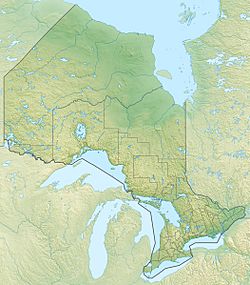Sullivan Lake (Cochrane District) facts for kids
Quick facts for kids Sullivan Lake |
|
|---|---|
| Location | Cochrane District and Timiskaming District, Ontario |
| Coordinates | 48°16′39″N 79°42′22″W / 48.27750°N 79.70611°W |
| Part of | Saint Lawrence River drainage basin |
| Primary outflows | Misema River |
| Basin countries | Canada |
| Max. length | 1,008 metres (3,310 ft) |
| Max. width | 230 metres (750 ft) |
| Surface elevation | 375 metres (1,230 ft) |
Sullivan Lake is a beautiful lake located in the northeastern part of Ontario, Canada. It sits mainly in the Cochrane District, with a small section reaching into the Timiskaming District. This lake is an important part of the natural landscape in this region.
Contents
About Sullivan Lake
Sullivan Lake is a freshwater lake known for its clear waters. It is about 1,008 meters (3,307 feet) long and 230 meters (755 feet) wide. The lake is found at an elevation of 375 meters (1,230 feet) above sea level.
Where is Sullivan Lake?
The lake is mostly within a geographic area called Ben Nevis Township. A small tip of the lake extends into Katrine Township. Both townships are in the larger region of Northeastern Ontario. This area is known for its vast forests and many lakes.
Part of a Big Water System
Sullivan Lake is connected to a much larger water system. It is part of the Saint Lawrence River drainage basin. A drainage basin is like a giant funnel where all the rain and snow that falls in an area eventually flows into one main river or lake. For Sullivan Lake, its waters eventually make their way to the Saint Lawrence River, which flows into the Atlantic Ocean.
Source of the Misema River
An interesting fact about Sullivan Lake is that it is the starting point, or "source," of the Misema River. This means the Misema River begins its journey right from Sullivan Lake. Rivers often start from lakes, springs, or melting glaciers.
Geological History
Sullivan Lake is located in an area with a fascinating geological past. It sits within the Pushkin Hills, which are part of something called the Blake River Megacaldera Complex.
What is a Megacaldera?
A megacaldera is the remains of a very, very large ancient volcano. Imagine a volcano so huge that when it erupted, its top collapsed, forming a massive crater. The Blake River Megacaldera Complex is one of the best-preserved examples of such a structure from billions of years ago. It shows us how powerful Earth's forces were in the distant past. The Pushkin Hills are a part of this ancient volcanic landscape.
 | Jewel Prestage |
 | Ella Baker |
 | Fannie Lou Hamer |


